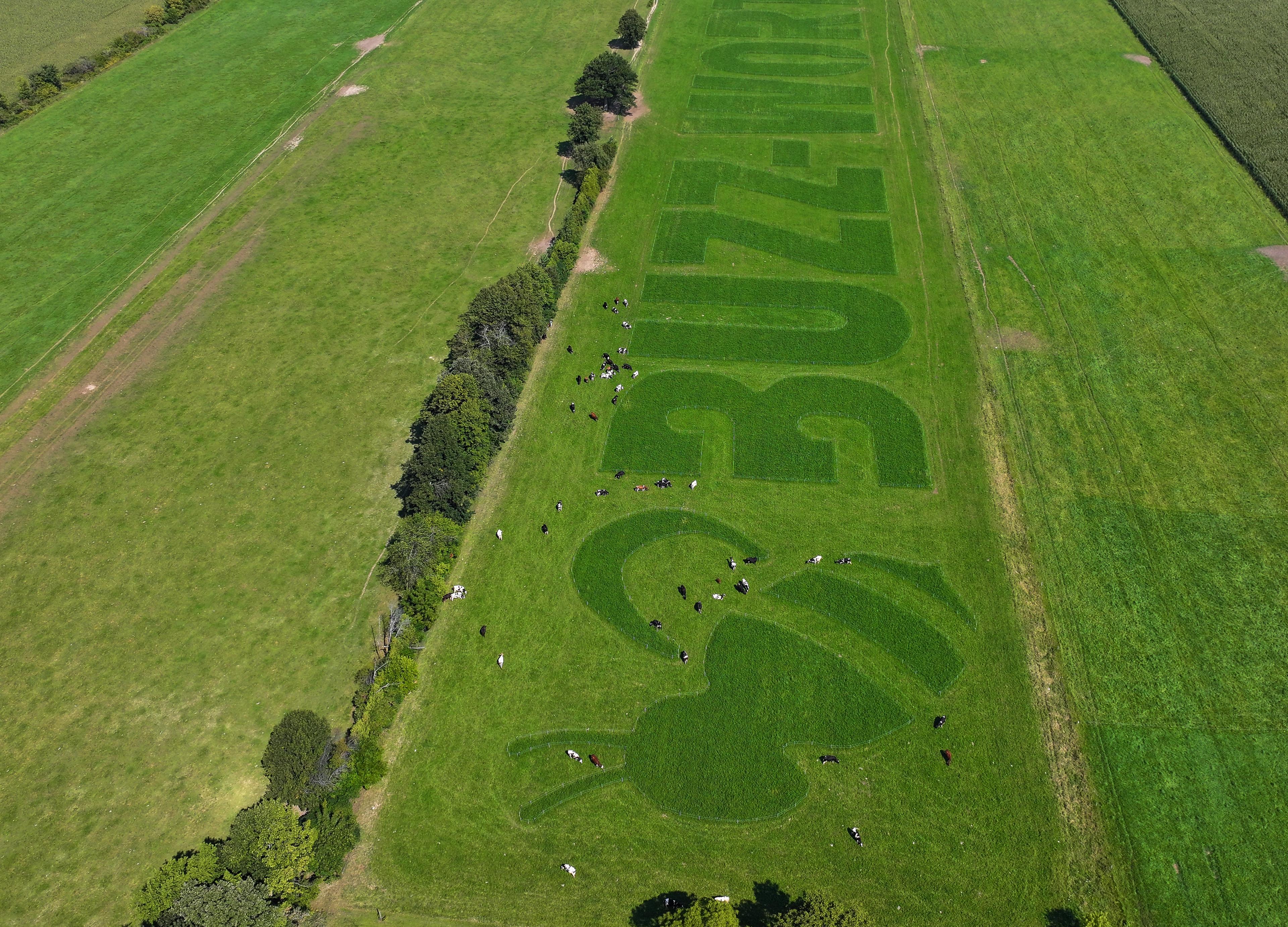
Earth
Organic Dairy Cows Demonstrate Spelling Skills on Small Farms
Airline travelers may do a double take upon landing or taking off from select airports in Maryland, Minnesota and Wisconsin over the next month. Through gentle nudging, cows are eating pasture grasses into the shape of letters!
Thanks to these busy bovines, the words “BUZZ-WORTHY” along with a picture of a bee are visible in farm fields far below. (Truth be told, one of the ads says “BUZZ-WORTH” for now thanks to cows that thought the grass was greener on the other side of the fence.)
Organic Valley’s grass-fed “greenest ads” are the result of a collaboration between cows, farmers and the earth. Three of Organic Valley’s small organic family farms provided pasture space to create these ads, but it would not have worked without the cows.
Co-op team members, Organic Valley farmers and helpers strategically put up fences in the shape of letters in pastures (powering through unexpected downpours, bee stings and a goat that caused shenanigans). Once the fences were ready, the farmers turned the cows loose to graze, doing a magic trick of creating letters by simply filling their bellies and making letters appear.

Eating the greens down around the fencing allowed the remaining greens to pop, making the words visible from thousands of feet above.
Like all of our organic pastures, the ads provide pollinator habitat and prevent soil erosion by preventing water runoff. The pasture grasses will regrow, and the farmers will reuse the fencing, making these ads zero-waste. Bonus: Milk from the cows who munched away to create the ads goes into delicious Organic Valley products, so some consumers can literally drink an advertisement!
Now, a little about the small family farms, cows and families involved in the ads … oh, and let’s not forget about the pollinators enjoying the habitat provided by the ads.
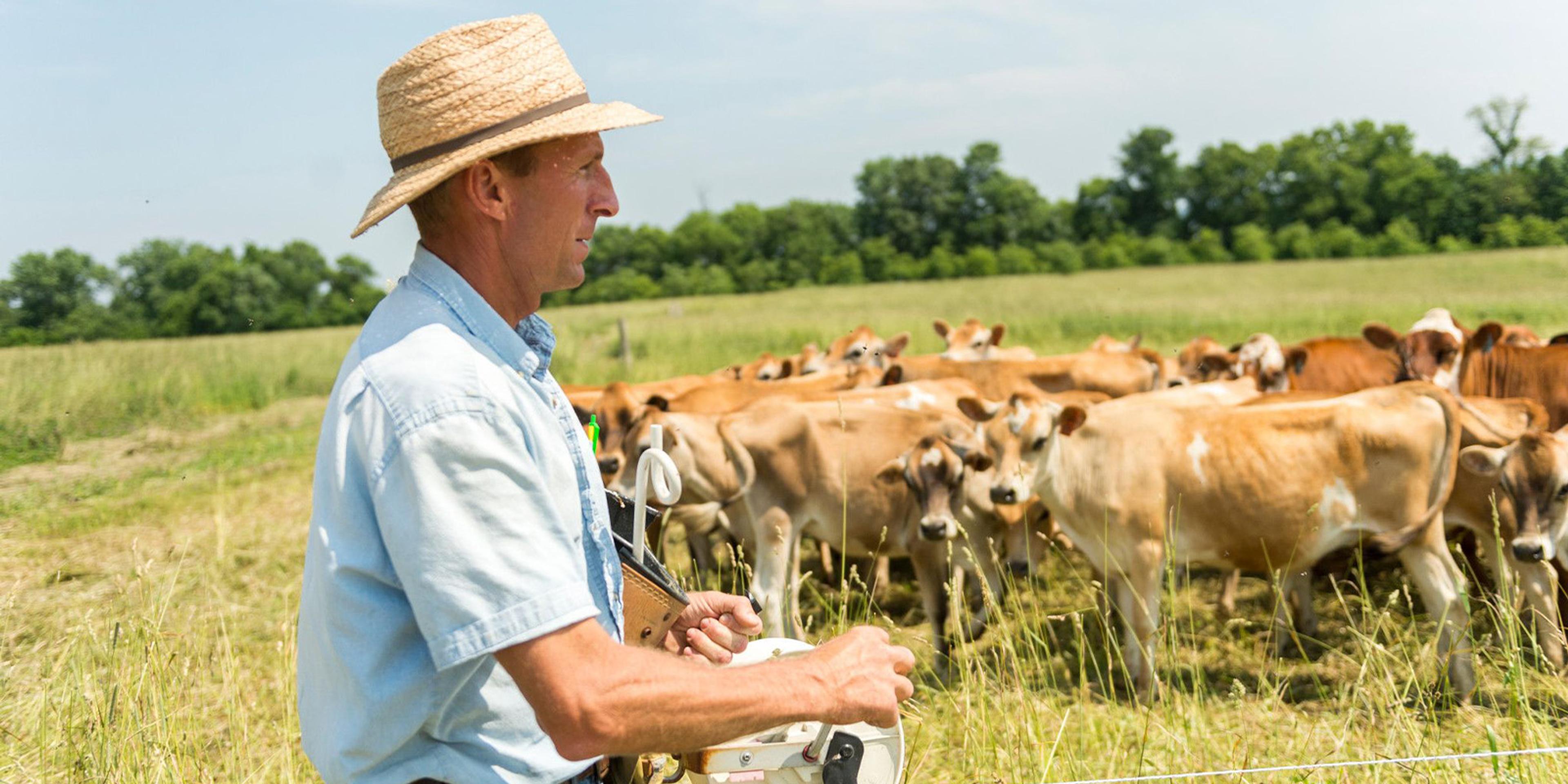
Farmer Ron Holter strings fence at his organic farm in Maryland.
The Holter Family of Maryland
The Holters have been farming in a quiet valley on the edge of the Blue Ridge Mountains since 1889. Ron Holter and his son, Adam, are partners on the six-generation farm. In 2000, the family started thinking about transitioning the farm to organic. They had already stopped using toxic herbicides, pesticides and synthetic fertilizers, but they could not find a market for their organic milk at the time, Ron said.
They were pioneers in their region when they switched to grazing to fill their cows’ bellies, unlike many Maryland farms that relied on grains.
Now, the Holters are one of fewer than 20 certified organic dairy farms in Maryland — about 75% of which are owned by Organic Valley farmers!
Ron and his wife Kathy tout the benefits of organic practices and have seen real improvement on their home farm since transitioning to organic. The Holters have not reseeded any pastures there since 1996, helping the soil become richer in soil organic matter and healthier every year. Land takes time to heal, and the family keeps the pastures in perennial polyculture which enriches soil, controls pests and provides biodiversity, Ron said.
“Every time you work the soil to reseed you are setting soil, you are killing diversity,” Ron said. “A 99-year-old pasture is better than a 5-year-old pasture. As soil goes, with age, it just gets better.”
Some neighboring farmers still don’t comprehend the benefits the Holters and ecosystem reap from their organic system of farming. Ron tries over and over to help them understand. Pioneers in grazing after all these years, “We are still the rebels on the outskirts,” Ron said.
Rebels that are causing quite a buzz with the pasture ad.
The Holters like the “fun and interesting” idea of their Jersey cows creating an ad to help drive awareness to the quality milk the family produces. The cows probably don’t care what font was used or if there are typos, but they may be a little bewildered by the new look of the pasture, which is typically fenced off in squares or rectangles.
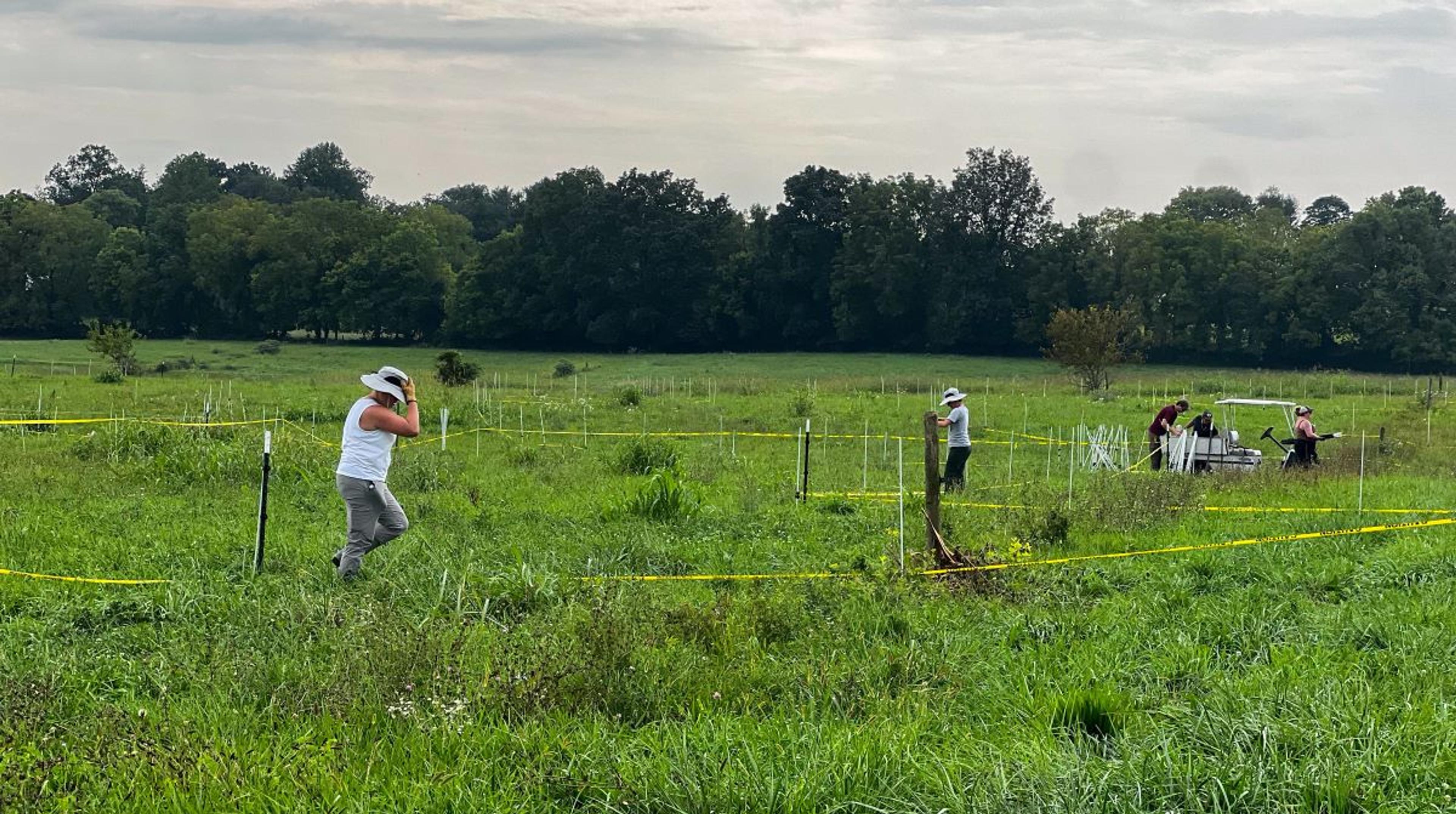
Fence-building at the Holter family's organic farm in Maryland.
They may notice the turns and cuts around the letters, but are still eager to graze and laze the day away in the thick greens. The cows are suckers for the orchard grass, fescue, blue grass, red clover, white clover, plantain and chicory the pasture is composed of.
And cows are not the only ones to fill their bellies and benefit from the pasture ads at the Holter farm. The pastures are alive with bees, butterflies, dung beetles and a variety of birds, including hawks, grasshopper and Savannah sparrows, Baltimore orioles, ground-nesting birds such as Eastern meadowlarks and more. And there are numerous other animals including deer, red fox, possums and groundhogs that take up residence on their farm.
“Buzz-worthy means our land and farm is worthy of the bees and pollinators,” Ron said. “If you build it, they will come, and we built it, and they came — thankfully.”
The rich milk from the cows that munched the grass around the letters at Holter’s Holterholm Farms, goes into Organic Valley Grassmilk® milk.
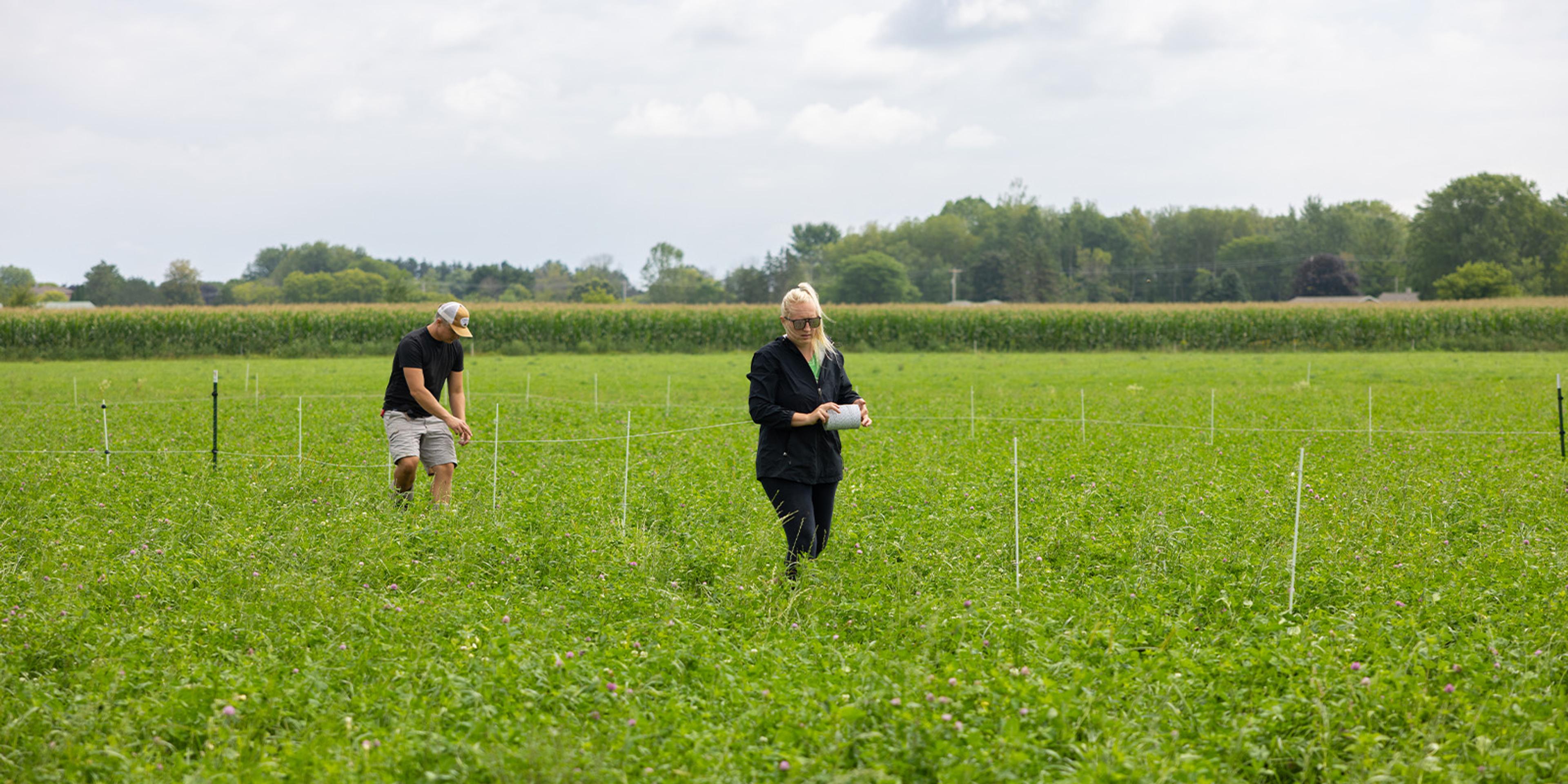
Melissa Weyland and Roy Owensby build fences at the Weyland farm near Green Bay, Wisconsin.
The Weyland Farm in Wisconsin
Melissa Weyland and Roy Owensby also volunteered their farm and dairy cows for the buzz-worthy project.
“Gary the Goat,” a dog in a goat's body, also decided to join the fence build and helped the cows munch the greens around the fence posts. A true team effort!
A curious bee also got in on the action — and Melissa’s boot — proof that pastures are buzzing. She walked off the sting and her only concern was, “I hope the bee is OK.” (A testament to an Organic Valley farmer’s commitment to land stewardship.)
Melissa and Roy have farmed in the picturesque northern Wisconsin region for the past two years. Melissa grew up on an Organic Valley farm, where her parents instilled in her the importance of land stewardship from a young age. Melissa developed an appreciation of organic farming over the 22 years that her parents farmed organically. This passion extended to her endeavors with her partner Roy, as they now run their own Organic Valley dairy farm.
Although Melissa learned the principles of organic farming early on, her and Roy’s journey is relatively recent and somewhat unconventional.
“We simply wanted to return to the land and make our own kind of difference,” she said.
And make a difference they did. In 2023, Melissa and Roy made the familiar yet exciting transition to joining Organic Valley — an homage to her childhood.
The two are deeply committed to their farming operations, focusing on land stewardship, caring for their cows and listening to the needs of the land.
When Organic Valley reached out asking to use their land for a green ad grazed by cows, Melissa and Roy were apprehensive.
“My initial thought was, ‘I don’t know if we can pull this off! The idea of making my cows walk into letters and weird spaces felt unusual,” she said.
However, after a few days the couple talked about how to make it work.
“It quickly became more than just about pulling it off perfectly; it became about doing something great for the plants, nature and migratory birds passing through. Even if it wasn’t perfect, it was still a great thing,” Melissa said.
Melissa’s enthusiasm was evident as she recounted the experience. “It was surreal,” she said. “I love talking about how buzz-worthy organic farming is, but seeing life in those letters, seeing monarchs and other wildlife in the field, that’s really special.”
On a recent walk through the pasture she saw several monarch butterflies.
“I hadn’t seen many monarchs all year, but there were hundreds out in those letters using the nectar from the red clover. It was breathtaking. It really was an honor to host them. And the irony of the message being ‘buzz-worthy’ with so many bees and butterflies — it was perfect.”
Melissa doesn’t begrudge the bee that stung her. “I thought, ‘Wow, that’s a sign of how much life is here now.’”
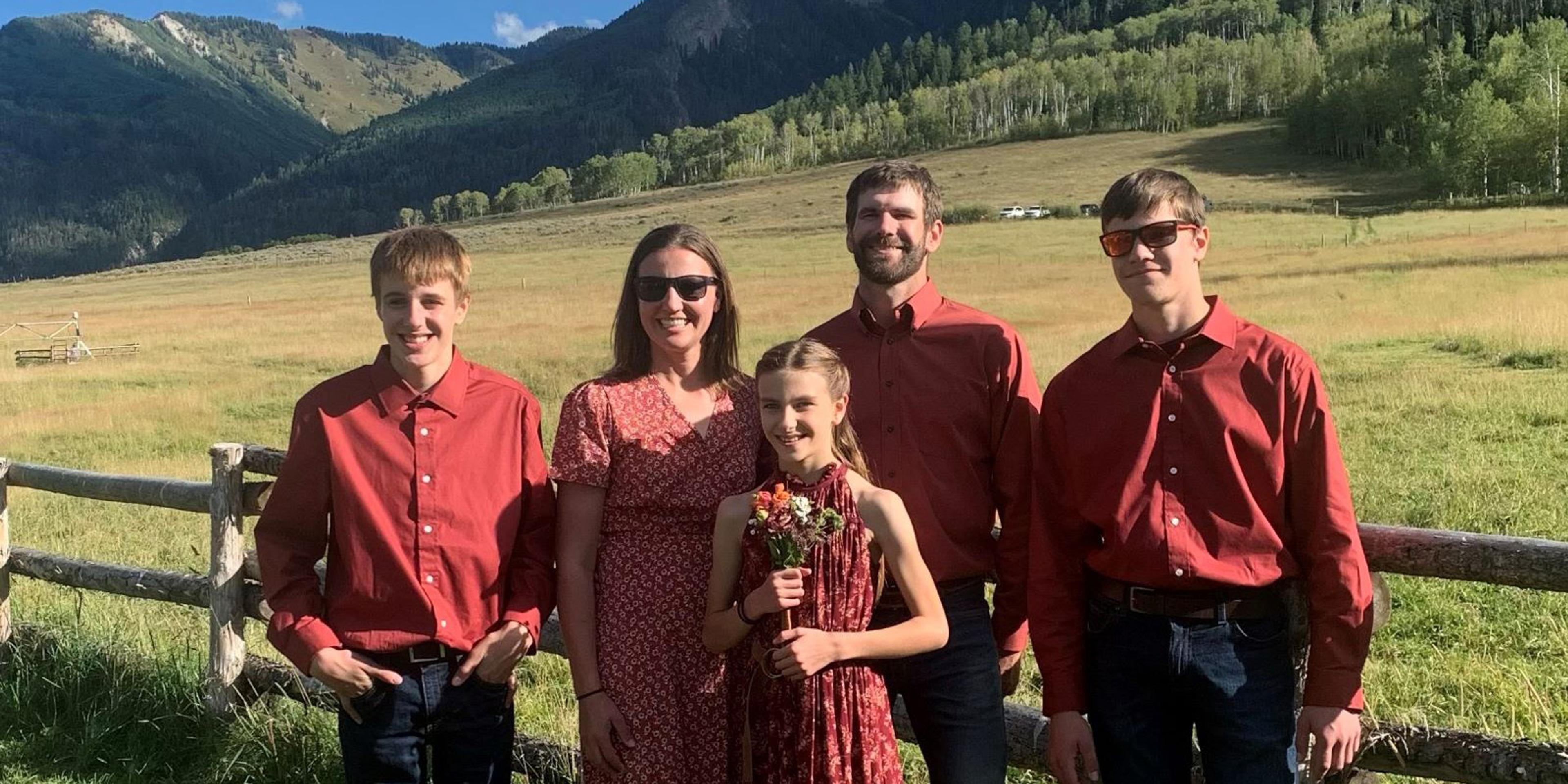
The Zweber family
The Zweber Family of Minnesota
The Zweber family also shared its fields to create green ads. The family embodies the saying, “The family that farms together stays together.” Farming runs deep in their blood, with more than a century of farming tradition rooted in their family’s history. Purchased in 1906, the Zweber family farm is situated in the rolling green hills of a quaint town in southern Minnesota, just 30 miles south of the bustling Twin Cities.
The farm has evolved over the years. Jon and Lisa Zweber and their son, Tim, alongside his wife, Emily, co-own and operate the farm. The family transitioned to certified organic in 2007, with the first milk delivery to Organic Valley in 2008.
Organic Valley is built on the foundation of establishing a stable pay price for farmers to ensure a sustainable living. In return, families provide quality, delicious and nutritious organic food products for consumers while helping the Earth.
The Zwebers do just that. They have raised a variety of livestock and crops on their land; today they focus on producing organic dairy and raising sustainable beef, pork, chicken and eggs (which they sell at their on-farm store — just in case you find yourself in the area!).
It’s important to the Zwebers that the next generation stays connected to the land. Emily keeps an especially busy schedule helping on the farm and home schooling their children: Erik, Jonnie and Hannah.
The Zwebers have always been a close-knit family, and that bond is reflected in their shared commitment to the farm. The children are regular helpers — including pitching in to create the ads. Erik, 17, and Jonnie, 15, took time from their regular school work and farm chores to help all four days with the massive fencing project by hauling equipment, measuring the design across multiple acres, pounding in stakes and running fencing.
Farming is more than a business for the family — it’s a way of life, one centered on respect for the land and the animals they raise.
“There’s a lot of life on our farm,” Emily said, emphasizing the family’s commitment to holistic farming practices. By prioritizing healthy, nutrient-rich soil, they ensure that the crops they grow and the animals they raise contribute to the production of quality foods, free from synthetic chemicals.
‘Y’ Did the Cows Do It?
How about the cows that decided a “Y” on the other side of the fence would be tasty? The ones that ate away what should have been a “Y” in “BUZZ-WORTHY?” Eh, we’re fine with it. The grass will grow back, and a new “Y” will appear. As long as the cows are happy, the bees are buzzing and our small organic family farms are thriving.
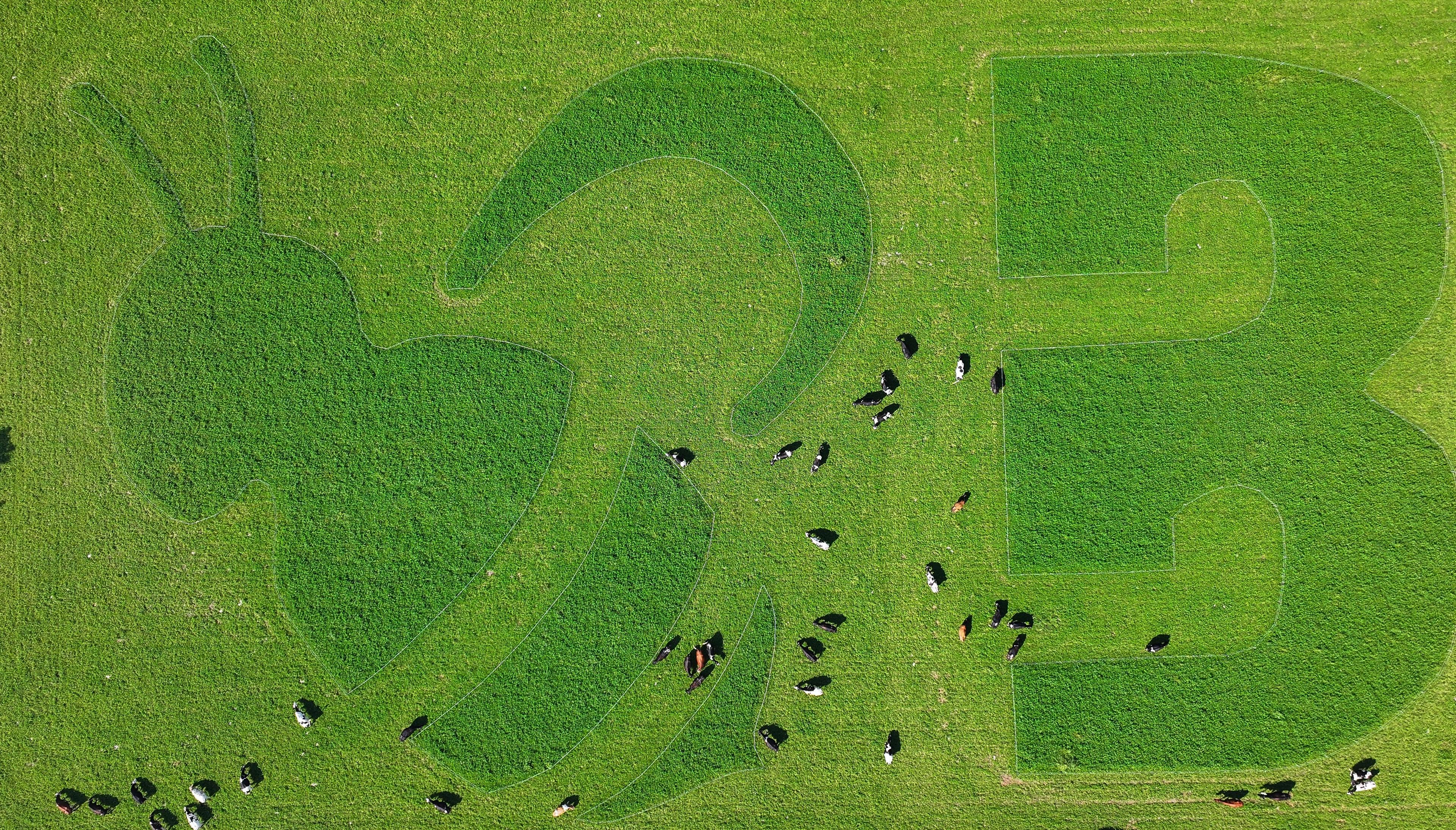
See how the more than 1,600 Organic Valley farmers across the nation are protecting where your food comes from here.
Related Articles
- Tags:
- farm life,
- biodiversity,
- pasture & perennial agriculture

















